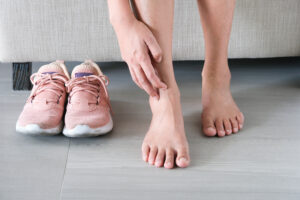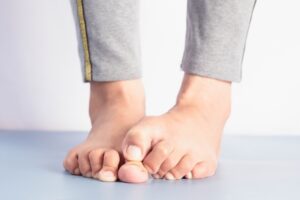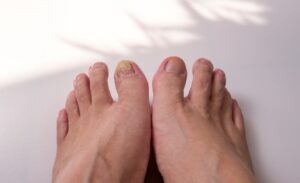Foot Fungus in Children: Complete Guide for Parents
As parents, our children’s health is our top priority. A common concern that may arise is the appearance of foot fungus in our little ones. At Efficient Laboratories, with over 40 years of experience caring for Spanish-speaking families, we understand the importance of having reliable information and safe solutions for the well-being of the entire family.
Can children develop foot fungus?
The answer is yes. Children can develop fungal foot infections, although the incidence is lower compared to adolescents and adults. The developing immune system and changes in physical activity habits can create favorable conditions for fungal growth.
Foot fungal infections in children, medically known as pedis dermatophytosis, are caused by microorganisms that thrive in warm and humid environments. While less common in very young children, the probability increases significantly when they begin participating in sports activities, using closed footwear more frequently, or frequenting public spaces like swimming pools.
How to detect foot fungus in young ones
Early detection is fundamental for effective management. Children may not adequately communicate their discomfort, so parental observation is crucial.
Main symptoms to observe:
Visible physical symptoms:
- Redness between toes
- Scaling or peeling skin
- Small blisters or cracks
- Changes in nail color or texture
- Skin that appears whiter or macerated
Behavioral symptoms:
- Frequent scratching of feet
- Complaints about itching or discomfort
- Resistance to putting on shoes or socks
- Changes in walking pattern
- Unusual foot odor
Differences between fungus and other skin conditions:
It’s important to distinguish between fungus and other common conditions in children:
Fungus vs. Eczema:
- Fungus usually affects spaces between toes
- Eczema can appear anywhere on the foot
- Fungus responds to specific antifungal treatments
Fungus vs. Contact dermatitis:
- Dermatitis usually relates to new products or materials
- Fungus persists without relation to specific products
- Fungus distribution is more characteristic
Specific risk factors in childhood
Activities and environments that promote infections:
Risk activities:
- Swimming in public pools
- Sports requiring closed footwear
- Playing in water parks
- Using shared showers
- Activities generating excessive sweating
Conducive environments:
- Gym locker rooms and showers
- Humid pool areas
- Footwear that doesn’t allow ventilation
- Synthetic socks that retain moisture
Developing hygiene habits:
Children are learning personal hygiene habits, which can create vulnerabilities:
- Incomplete drying of feet after bathing
- Prolonged use of the same pair of shoes
- Sharing footwear with other children
- Lack of regular sock changes
Myths and realities about childhood foot fungus
MYTH: Fungus in children is always the result of poor family hygiene
REALITY: Even families with excellent hygiene can face fungal infections due to exposure in public environments
MYTH: Foot fungus in children disappears on its own over time
REALITY: Fungal infections require proper attention and treatment to avoid complications
MYTH: Only very active children in sports develop fungus
REALITY: Any child can develop fungus, especially when starting to wear closed footwear regularly
MYTH: Home remedies are always safe for children
REALITY: It’s essential to use products specifically formulated and safe for pediatric use
Prevention strategies for the whole family
Hygiene routines adapted for children:
Recommended daily routine:
- Washing feet with warm water and mild soap
- Careful drying, especially between toes
- Regular visual inspection of feet
- Application of preventive products when appropriate
Teaching healthy habits:
- Involving children in their care routine
- Explaining the importance of keeping feet dry
- Creating visual reminders for sock changes
- Making foot care a family activity
Choosing appropriate footwear and socks:
Ideal footwear characteristics:
- Breathable materials like leather or natural fabrics
- Adequate size allowing natural movement
- Soles that allow ventilation
- Alternating between different pairs
Sock selection:
- Prefer cotton or absorbent materials
- Avoid synthetic fibers that retain moisture
- Mandatory daily change
- Extra socks for sports activities
When to seek professional guidance
It’s recommended to consult with a healthcare professional when:
- Symptoms persist after preventive measures
- There are signs of secondary infection
- The child experiences significant pain
- Symptoms interfere with daily activities
- Symptoms appear in multiple family members
How Efficient Labs supports family care
At Efficient Laboratories, we understand that family healthcare requires reliable and safe products. Our antifungal products Hongo Killer® and Ongo Fin® have been formulated considering the specific needs of Spanish-speaking families.
Characteristics that support family care:
- Formulations backed by scientific research
- Over 40 years of experience in family health products
- Availability in trusted pharmacies and stores
- Commitment to safety and efficacy
Our comprehensive approach includes:
- Products developed with pharmaceutical quality standards
- Educational information for parents
- Accessibility in Spanish-speaking communities
- Continuous support for families
Key Information for Parents:
✔ Why is addressing foot fungus in children relevant?
- Prevents complications and secondary infections
- Maintains child’s well-being and comfort
- Prevents spread to other family members
- Establishes healthy hygiene habits from an early age
✔ Key factors for preventive management:
- Constant observation and early detection
- Age-appropriate hygiene routines
- Proper selection of footwear and socks
- Education about healthy habits
✔ Benefits of using solutions backed by scientific evidence:
- Greater safety in products for pediatric use
- Proven effectiveness in infection management
- Specific formulations for family needs
- Support from decades of health experience
✔ Practical tips for parents:
- Inspect your children’s feet regularly
- Maintain a dry environment in footwear and socks
- Teach your children about the importance of foot hygiene
- Create family foot care routines
- Keep appropriate preventive products at home
Calls to Action (CTA):
Have questions about your family’s foot care? Consult with our family health specialists and discover how our products can be part of your preventive care routine.
Discover our family antifungal solutions
Visit efficientlabs.com and learn about our complete line of Hongo Killer® and Ongo Fin® products, formulated with your entire family’s well-being in mind.
Contact us for personalized advice
📧 info@efficientlabs.com
📞 +1 (305) 805-3456
🕒 Monday to Friday, 9:00 a.m. to 5:00 p.m. EST
Find our products at your local pharmacy
Our products are available in pharmacies, department stores, and supermarkets throughout the United States and Puerto Rico. Protect your children’s health with the confidence of over 40 years caring for families!




